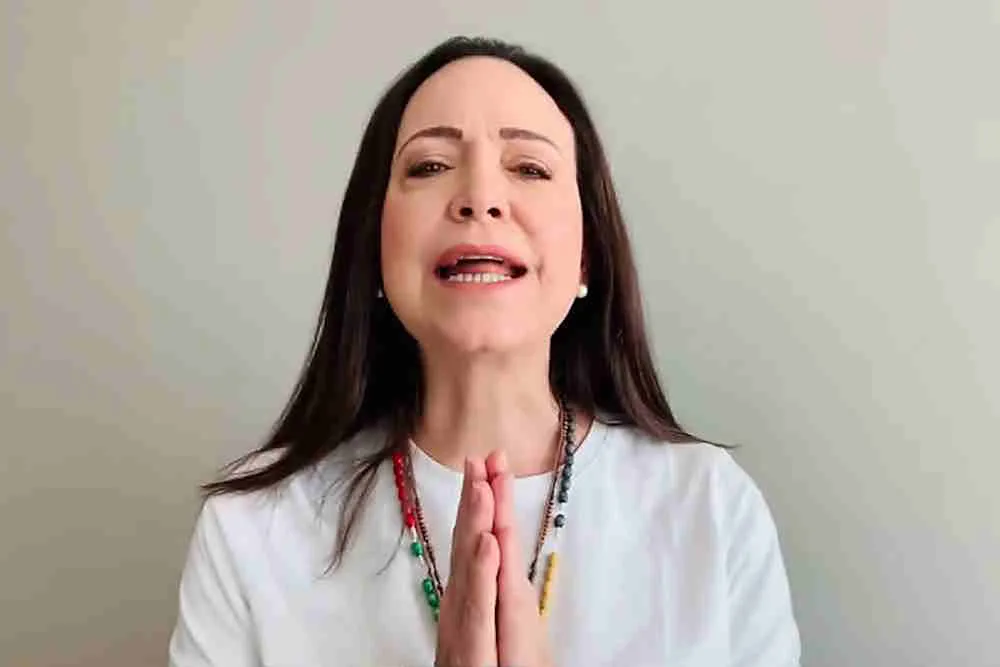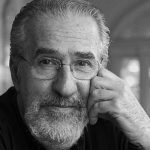
Screenshot of María Corina Machado in a video posted to her Instagram account on January 10, 2025. Photo: Instagram/@mariacorinamachado.

Orinoco Tribune – News and opinion pieces about Venezuela and beyond
From Venezuela and made by Venezuelan Chavistas

Screenshot of María Corina Machado in a video posted to her Instagram account on January 10, 2025. Photo: Instagram/@mariacorinamachado.
By Atilio A. Boron – Oct 12, 2025
The awarding of the Nobel Peace Prize to María Corina Machado is the culmination of a long process of moral and political decay that has irreparably tarnished the prize. They may continue to award it year after year, but the unpleasant odor of her ethical inconsistency and political opportunism in service to Washington will always cling to it.
Of course, what happened these days is nothing new—the prize had been discredited long before. While it was awarded exceptionally to those whose careers were clearly marked by their commitment to peace—Martin Luther King in 1964, Mother Teresa of Calcutta (1979), Adolfo Pérez Esquivel (1980), South African Archbishop Desmond Tutu (1984), Nelson Mandela (1993) and a few others—the awarding of this prize to Henry Kissinger in 1973, a serial killer responsible for the brutal bombing of Vietnam and the destabilization of democratic processes like Salvador Allende’s Chile, permanently marked the perversion of Alfred Nobel’s original idea: to reward individuals or organizations that fight for peace and the peaceful resolution of conflicts.
The same can be said of Barack Obama’s award, unusually granted just months into his term “for his extraordinary efforts to strengthen international diplomacy and collaboration among peoples,” according to the official statement. Unfortunately, the facts contradicted the Nobel Committee, because during his eight years in office, Obama did not go a single day without waging wars or carrying out military operations abroad. During that period, he ordered 563 strikes, primarily using drones, to eliminate “terrorist targets” in Pakistan, Somalia, and Yemen—a scandalous figure when compared to the 57 strikes ordered by the administration of George W. Bush, the inventor of the “war on terror.” Between 384 and 807 civilians died in those countries, in the vast majority of cases while the occupant of the White House was already holding the Nobel Peace Prize.
The awarding of the prize to María Corina Machado is yet another addition to this grim inventory. Machado is a persistent cultivator of violence, a habit unchallenged since Hugo Chávez Frías was elected president of Venezuela under the laws of the Fourth Republic in December 1998. As soon as the Bolivarian leader took office, Machado and other figures from the old and corrupt politics of the Fourth Republic launched into conspiracy. Their plans materialized April 11, 2002, with the coup d’état that miraculously did not end Chávez’s life.
The coup plotters drafted an act pompously titled “Constitution of the Government of Democratic Transition and National Unity,” which launched the de facto government presided over by Pedro Carmona, president of the powerful Fedecámaras (Venezuelan Federation of Chambers of Commerce). The administration of this champion of democracy was exemplary—except for its short duration. But he wasted no time, something progressive governments are often accused of: in his first official act, he dissolved the National Assembly, the Supreme Court of Justice and the National Electoral Council with a stroke of the pen; removed the attorney general, the comptroller general of the republic and the ombudsman; dismissed all governors, mayors and council members; decreed the dismissal of all ambassadors, consuls and vice-consuls; eliminated the 49 enabling laws and the constitutional amendment; and restored Venezuela’s traditional name, abolishing its status as a Bolivarian Republic.
This entire attack on Venezuela’s democratic institutions was ratified by a call to the country’s “living forces,” who gathered at the Miraflores Palace to endorse the birth of the new regime by signing the document establishing the aforementioned measures. Among the signatories was María Corina Machado.
Was that her only youthful sin? No—it was just the beginning of a career increasingly marked by recourse to violence. She made a pilgrimage to Washington to meet with President George W. Bush in the Oval Office of the White House on May 31, 2005, requesting help in overthrowing Venezuela’s constitutional government. In other words, she proposed a U.S. military intervention that would have provoked a bloodbath in her own country. She persisted in this conduct, and in March 2014—coinciding with the first of the bloody “guarimbas,” barricades erected by lumpen elements and armed paramilitaries organized by the Venezuelan right to overthrow the government—Machado reappeared on the international scene as the unlikely “alternate ambassador” of Panama—yes, you read that right, of Panama, not Venezuela—at a session of the Permanent Council of the Organization of American States, despite the fact that she was then a member of Venezuela’s National Assembly. Their objective: to request, in an act of vile treason, that the OAS Permanent Council order a multinational military intervention against their own country to overthrow President Nicolás Maduro.
In 2017, the “guarimbas” resurfaced, enjoying the full support of the Venezuelan right and its American patrons. Yet María Corina—now the Nobel Peace Prize winner—did not condemn their abhorrent crimes against the population in the slightest. On the contrary, throughout these years, she constantly called for foreign military intervention to overthrow the Bolivarian government and never issued the slightest condemnation of the “guarimberos” who blocked streets and neighborhoods so no one could leave their homes, fabricating the image of a civic strike to force the government’s collapse. Those who dared to leave were viciously attacked, if not killed. They went so far as to burn alive people whose only crime was appearing to be Chavistas. The documentation of these crimes is overwhelming—as is Machado’s complicit silence.
It cannot be forgotten that for so many years, this “patriotic” Venezuelan leader tirelessly lobbied the governments of the United States and the European Union to impose harsh economic and other sanctions on the Bolivarian Republic of Venezuela. She was also tried for conspiracy after an NGO she created and directed received funding from the National Endowment for Democracy—financed by the U.S. Congress—for campaigns to destabilize the Bolivarian government.
María Corina Machado is the very personification of fascism’s violent methods. In almost every country, she would have faced extremely severe sentences for soliciting a foreign invasion of her own nation or for promoting unilateral coercive measures that inflict enormous suffering and deprivation on her own people. Her unbridled violence and calculated servility to her imperial master forced her into resounding silence in the face of the horrific genocide underway in Gaza—not to mention the risks to the Venezuelan people posed by the deployment of U.S. naval forces to the southern Caribbean and the potential for resulting aggression. It is no surprise that she dedicated her Nobel Prize to Donald Trump, nor that Western media hitmen have hailed her as a heroine, a champion of peace, human rights and democracy.
Such praise is understandable: these are the same media outlets and rulers who, for two years, beatifically turned a blind eye while endorsing, financing and offering full diplomatic cover to the Israeli government as it perpetrated the barbaric genocide of the Gazans. Reading the Western press—with very few exceptions—is nauseating in the face of such lies, double standards and the systematic concealment of countless crimes. That is why the countries of the collective West, in frank and irreversible decline, are jubilantly celebrating the Nobel Prize awarded to María Corina Machado. When informed of the award given to the Venezuelan opposition figure, President Donald Trump’s special envoy for special missions, Richard Grenell, simply commented laconically: “The Nobel Prize died years ago.” He is right—but one last nail was missing to seal the coffin. María Corina Machado provided it.
Translation: Orinoco Tribune
OT/JB/SH

Atilio A. Borón is a Harvard Graduate professor of political theory at the University of Buenos Aires and was executive secretary of the Latin American Council of Social Sciences (CLACSO). He has published widely in several languages a variety of books and articles on political theory and philosophy, social theory, and comparative studies on the capitalist development in the periphery. He is an international analyst, writer and journalist and profoundly Latinoamerican.